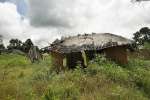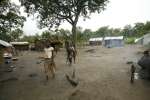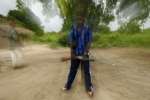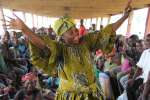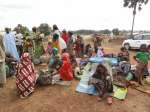UNHCR seeks US$545 million for Nigeria and CAR crises
News Stories, 25 January 2016
YAOUNDÉ, Cameroon, Jan 25 (UNHCR) – The UN Refugee Agency and its partners on Monday called on donor nations for more than half-a-billion US dollars this year to help hundreds of thousands of people forced to flee conflicts in Nigeria and the Central African Republic (CAR) and the host communities providing them with shelter and other basic services.
The two Regional Refugee Response Plans (RRRP), presented at a donor briefing in Yaoundé, Cameroon, include US$198.76 million for 230,000 Nigerian refugees and some 284,300 members of host communities in Niger, Chad and Cameroon as well as US$345.7 million for 476,300 CAR refugees and some 289,000 people hosting them in Chad, Cameroon, Democratic Republic of the Congo (DRC) and Republic of Congo.
Both RRRPs cover needs in sectors such as protection, education, food security, health and nutrition, livelihoods, shelter, basic aid and water, hygiene and sanitation. The CAR appeal is being made by 25 organizations, including UNHCR and other UN agencies as well as NGOs.
The Nigeria appeal is made by 28 organizations. UNHCR alone is seeking US$189.54 million under the Central African Republic RRRP and US$62.33 million for the Nigeria one.
"These two humanitarian crises must not be forgotten; they are not going away. The suffering is great and the needs acute among both the displaced and host communities," said Liz Ahua, UNHCR's Regional Refugee Coordinator for the CAR and Nigeria situations.
Ahua said violence occurs on almost a daily basis in north-east Nigeria and CAR, generating fear and new displacement in the region, citing as examples suicide attacks, kidnapping, indiscriminate killings and massive human rights abuses.
"There is light at the end of the tunnel, but we won't see it unless there is a much stronger commitment from African governments and the international community to help re-establish stability and peace," Ahua said, urging donors to give more generously. In 2015, the Nigerian RRRP received 52 per cent of its financial requirements whilst the Central African Republic RRRP received just 27 per cent.
Despite important steps towards restoring peace in both north-east Nigeria and CAR, there were also reverses and continuing significant population displacement in 2015. In Nigeria, the government rolled back Boko Haram gains, but the insurgent group turned to terror tactics that spread into neighbouring countries.
In CAR, relative peace was punctuated by waves of violence that triggered flight within the country and into the DRC, but the first round of the presidential election passed peacefully in late December with the participation of tens of thousands of refugees in Chad, Republic of Congo and Cameroon. The second round is due in February.
The crises in Nigeria and CAR will continue to provide major challenges throughout 2016 in countries such as Cameroon, which provides sanctuary and assistance to refugees from both Nigeria and CAR. For just this country, the appeals seek US$130.8 million to help 234,500 CAR refugees and almost 216,700 host community members and US$56.36 million for 100,000 Nigerian refugees and 20,000 hosts in Cameroon.
Highlighting some of the needs, Ahua said: "We need funding to prevent malnutrition among children; to run schools, build up proper sanitation systems and provide clean water; and to make sure that families have shelter over their heads."
The Nigeria and CAR regional response plans are part of the wider 2016 humanitarian appeal, asking for US$20.1 billion to reach 87 million people around the world, launched last December.
You can read the Nigeria RRRP here and the Central African Republic RRRP here.





